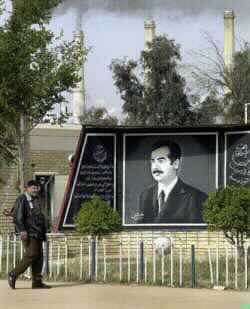Chief U.N. weapons inspector Hans Blix ordered Iraq on Friday to destroy dozens of its missiles with ranges that violate U.N. limits, and gave Baghdad a March 1 deadline to begin the demolition. Observers say his demand that Iraq eliminate the Al Samoud 2 missile system will test Baghdad's willingness to disarm as negotiations for possible war enter a crucial stage. Washington has strongly pushed for the destruction of the missiles and all their components.
Anglo-American Efforts Focus on Preparing a Second UN Resolution
The United States and Britain are trying to focus the world's attention on illegal Iraqi weapons activities while they prepare a new U.N. resolution that could pave the way for military action. Secretary of State Colin Powell sought support for the resolution from foreign ministers of four Security Council nations Friday.
Iraq's decision will likely be a factor in whether the council approves such a resolution, which is expected to be introduced early next week. Washington's goal is to achieve a minimum nine votes on the council, while avoiding a veto by France, Russia or China. All three of those permanent members are opposed to war and want to extend the weapons searches.
Order Confronts Iraq with a Dilemma
The order to destroy the Al Samoud 2 missiles confronts the Iraqi government with a serious dilemma: whether to give up a valuable weapons system its military would almost certainly use against a U.S.-led coalition, or refuse to comply and face accusations that it is not cooperating with U.N. inspectors.
There was no immediate response from Iraq to the Blix letter.
But earlier Friday, Mohammed Modhaffar al-Adhami, a member of Iraq's parliament, said he believed Iraq would destroy the missiles if so ordered.
Blix Working on a List of 35 Outstanding Issues Concerning Iraq's Disarmament to Be Presented to UN Security Council
Stepping up the pressure on Saddam, Blix was also preparing a list of more than 35 outstanding issues surrounding Iraq's disarmament that he will present to his advisory board of commissioners when they meet on Monday at U.N. headquarters.
The list won't be included in his March 1 report but he will likely be asked about it when he addresses the council, probably on March 7. U.S. officials have said they would be paying close attention to the list, which could serve as a barometer for what inspectors have and haven't gotten from Iraq.
The list has included some questions about Iraq's missile programs.
Key Developments Concerning Iraq
* Turkey's foreign minister said a "broad agreement" had been reached with the United States on basing American soldiers here for a possible Iraq war and that remaining disagreements would likely be resolved. But the prime minister said a final agreement may still be days off
*_ Secretary of State Colin Powell said if Saddam Hussein leaves Iraq, there will be no war. "People are hoping that war can be avoided," Powell said. "I hope it can be avoided. But the one who has the power in his hands to decide whether there will be a war or peace is Saddam Hussein."
*_ Iraqi Vice President Taha Yassin Ramadan offered a "dialogue" with the United States, saying in an interview that his country was ready to talk if Washington abandons "aggression" and ceases "interference in internal affairs."
*_ Half of the U.N. humanitarian staff in Iraq has left the country over the last two weeks to make a possible evacuation easier in case of war, a U.N. official said.
*_ Iraq campaigned for support among one of the world's largest political groupings against invasion by the United States, but diplomats were unable to agree on a strongly worded declaration that characterized any attack as "aggression."
The delegates of the 114-nation Non-Aligned Movement were meeting in Kuala Lumpur, Malaysia.
*_ The lower house of the Russian parliament called for legislators from around the world to meet in Baghdad next month to discuss how to stave off a U.S. attack on Iraq - a dramatic idea that seemed unlikely to materialize.
*_ Powell appealed to Chancellor Gerhard Schroeder and the German public to reconsider their opposition to war in Iraq, insisting that war is sometimes unavoidable. Germany's conservative opposition leader is heading to Washington next week to tell the Bush administration not all Germans share Schroeder's flat refusal to back war on Iraq and that some want to heal the bitter rift with the United States.
PHOTO CAPTION
An Iraqi soldier walks in front of a portrait of Iraqi President Saddam Hussein and smoke stacks of a power station in Al-Musayyib, 60 kilometers (37 miles) southeast of Baghdad while U.N. weapons inspectors, unseen, investigate inside Friday Feb. 21, 2003. (AP Photo/Ali
- Author:
& News Agencies - Section:
WORLD HEADLINES


 Home
Home Discover Islam
Discover Islam Quran Recitations
Quran Recitations Lectures
Lectures
 Fatwa
Fatwa Articles
Articles Fiqh
Fiqh E-Books
E-Books Boys & Girls
Boys & Girls  Women
Women










